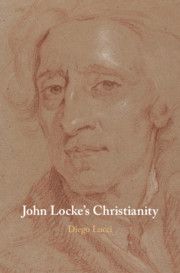Book contents
- John Locke’s Christianity
- John Locke’s Christianity
- Copyright page
- Contents
- Acknowledgments
- Introduction
- 1 The Context and Background of Locke’s Biblical Theology
- 2 Engaging with Scripture and Heterodoxy
- 3 A Scripture-Based Moralist Soteriology
- 4 The Soul and the Last Judgment
- 5 The Trinity and Christ
- 6 Religious Toleration and Christian Irenicism
- Conclusion
- Bibliography
- Index
4 - The Soul and the Last Judgment
Published online by Cambridge University Press: 24 September 2020
- John Locke’s Christianity
- John Locke’s Christianity
- Copyright page
- Contents
- Acknowledgments
- Introduction
- 1 The Context and Background of Locke’s Biblical Theology
- 2 Engaging with Scripture and Heterodoxy
- 3 A Scripture-Based Moralist Soteriology
- 4 The Soul and the Last Judgment
- 5 The Trinity and Christ
- 6 Religious Toleration and Christian Irenicism
- Conclusion
- Bibliography
- Index
Summary
Locke was a mortalist, as he argued that the soul dies with the body. He thought that the resurrection of the dead will take place by divine miracle on Judgment Day, when the saved will be admitted to eternal beatitude while the wicked will experience a second, final death. He was also agnostic about the ontological constitution of thinking substances or souls. Moreover, he questioned the resurrection of the body, since he argued that our corruptible, mortal bodies will be changed into incorruptible, spiritual bodies at resurrection. Locke’s position on the soul and the resurrection of the dead implies that personal identity is neither in the soul, nor in the body, nor in a union of soul and body. In "Essay" II.xxvii (1694, 2nd ed.), he argued that consciousness alone makes personal identity. To Locke, the same self exists diachronically, in this life and beyond it, “by the same consciousness.” However, Locke’s “annexing” of punishment to personality, and of personality to consciousness, does not contradict his notion of repentance, for he saw repentance as necessary but not sufficient to salvation and, emphasizing faith, he believed in God’s forgiveness of the repentant faithful.
Keywords
- Type
- Chapter
- Information
- John Locke's Christianity , pp. 106 - 133Publisher: Cambridge University PressPrint publication year: 2020

